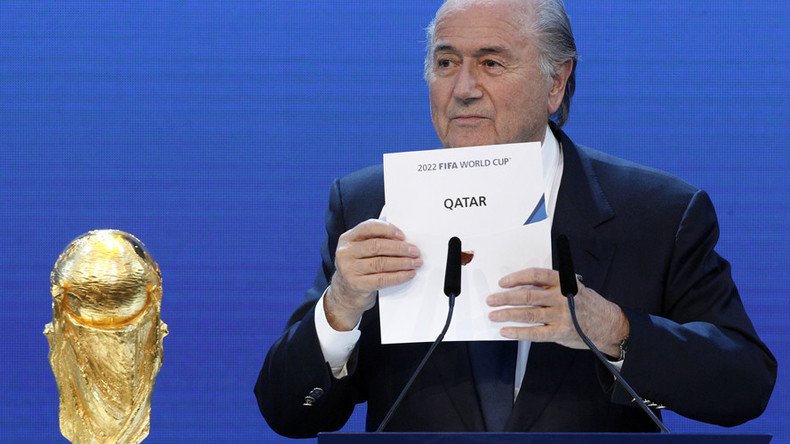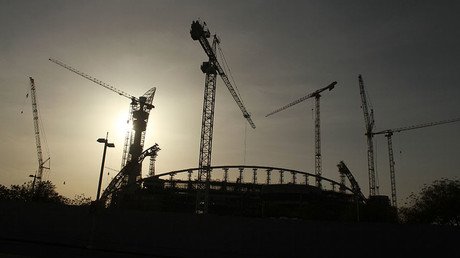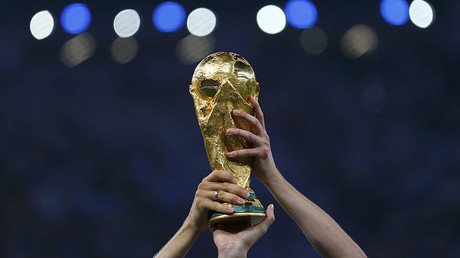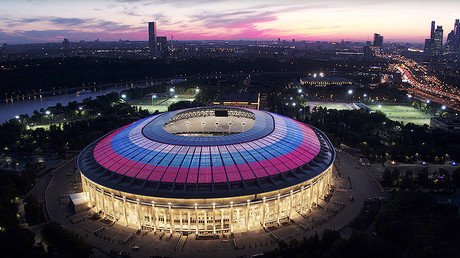Qatar ‘undermined integrity’ of FIFA World Cup bidding process – leaked report

As Qatar gears up to host the World Cup in 2022, a leaked report published by German tabloid Bild suggests the Gulf country and FIFA took part in corrupt practices during and after the bidding process. FIFA has since released the report in full.
Bild has published the first of a series of extracts from the 430-page report, which was written by former FIFA independent ethics investigator Michael Garcia in 2014. The dossier represents one of the biggest investigations ever carried out in the world of sports.
430 Seiten, die in die Abgründe der #FIFA führen...#GarciaReport#katarpic.twitter.com/Mcg7Dkk7cG
— Peter Rossberg (@PRossberg) June 26, 2017
One extract of the report states that those seeking to bring the World Cup to Qatar “served to undermine the integrity of the bidding process.”
In particular, the report mentions the role played by Aspire Academy, one of the biggest sports academies in the world, which aims to find and develop Qatari athletes.
It says that "at a minimum, the targeting of Aspire-related resources to curry favor with the Executive Committee members created the appearance of impropriety. Those actions served to undermine the integrity of the bidding process."
The report also claims that three FIFA executive members were flown to Rio by a private jet provided by the Qatari Football Association, ahead of the vote for 2018 and 2022 World Cup hosting rights.
It also states that the 10-year-old daughter of a FIFA official received a deposit of £2 million (US$2.5 million) into her bank account months after the ballots were cast.
In addition, the report claims that the husband of one of disgraced former FIFA President Sepp Blatter’s closest aides was handed a contract in Qatar for his construction company.
Meanwhile, Peter Rossberg, the Bild journalist who obtained the copy of the report, wrote on Facebook that the dossier does not provide “proof” that the World Cup in Qatar had been bought.
“It would also be too naive to believe that people like Garcia or [then-deputy chairman of the investigatory chamber of FIFA ethics committee Cornel] Borbely would have been able to find a definitive proof of this.”
In another post, Rossberg again stressed that there was no proof that Qatar “bought” the privilege of hosting the World Cup, but said a different conclusion was unlikely.
Although Garcia wrote the report in 2014, it was never published in its entirety. Instead, FIFA executives agreed to publish a “legally appropriate version” of the report.
A 42-page summary of Garcia’s findings was released by German judge Hans-Joachim Eckert. Those 42 pages cleared Qatar of corruption allegations.
Garcia was unhappy with that summary, saying it contained “numerous materially incomplete and erroneous representations.” He resigned in protest in December 2014.
Meanwhile, French prosecutors have also been looking into FIFA’s decision to award the 2022 World Cup to Qatar, and the 2018 tournament to Russia, a source told Reuters in April. Possible offenses include private corruption, conspiracy, and influence peddling, the source said.
READ MORE: Briton dies working on 2022 World Cup stadium in Qatar
Although the report leaked to Bild reportedly focuses mainly on Qatar, Rossberg did mention Russia in one of his Facebook posts, saying there is also “no proof” that its World Cup award was “bought.”
FIFA and Qatar have also faced scrutiny over the construction of the World Cup stadium, with labor unions claiming employees are being treated unfairly. Amnesty International slammed both bodies last year, stating that workers’ passports had been confiscated and their wages withheld, while being forced to live in squalid accommodation.
‘Illegally leaked’
Hours after the first excerpts were published by Bild, FIFA released the full report for the very first time.
It claims the publishing “had been called for on numerous occasions by FIFA President Gianni Infantino” and was “supported by the FIFA Council since its meeting in Mexico City in May 2016.”
The statement goes on to place the blame on the former chairpersons of the ethics committee.
“Despite these regular requests, it is worth noting that the former chairpersons of the Ethics Committee, Cornel Borbély and Hans-Joachim Eckert, had always refused to publish it.”
It stresses that the full report was “illegally leaked to a German newspaper,” and that it was published by FIFA “in order to avoid the dissemination of any misleading information.”
Russia didn't influence FIFA votes
The Russian section of the report published by FIFA stated that there is "no evidence in this record to suggest that the Russia Bid Committee attempted to exert undue influence on any FIFA ExCo Members in order to secure their votes."
It went on to state that any gifts given to FIFA officials by Russia were "of a symbolic and incidental value," and thus didn't violate any rules.
"Even though the travel and accommodation costs for FIFA ExCo Members (partly accompanied by their families) were fully assumed by the Russia Bid Committee, such cost coverage was acceptable under the FIFA Rules of Conduct in force at the relevant time," the report states.
It also notes that insufficient evidence was found to suggest that the Russia Bid Committee had attempted to influence the bidding process by contacting FIFA ExCo members, citing documents and testimonies.
Lastly, the report says that there is "no evidence of collusion of [the] Russian Bid with another bid committee or member association," despite a "vague suggestion" by Khozo Tashima, CEO of the Japan Bid Committee and vice president and executive general secretary of the Japan Football Association, that a vote-trading agreement had been in place between Russia and Japan.















